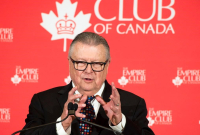Support strong Canadian climate journalism for 2025
The federal Tories are accusing the Trudeau government of playing politics by stripping specific references to specific religious groups from its annual report on terrorism.
Conservative public-safety critic Pierre Paul-Hus suggested to the House of Commons national-security committee Monday that the Liberals bowed to "pressure tactics" simply to avoid offending anyone.
Public Safety Minister Ralph Goodale said the government removed the terms "Sikh," "Sunni" and "Shia" from the report when referring to extremism to avoid conveying the impression that an entire religion or community is a threat to national security.
He told the committee it was not a partisan issue but rather an effort to be accurate, precise and fair in conveying information about terrorist threats.
"Canadians of all faiths and backgrounds have helped to build our country and continue to be integral members of our communities and neighbourhoods," Goodale said.
"It is neither accurate nor fair to equate any one community or an entire religion to extremist violence or terror. To do so is simply wrong and inaccurate."
Brampton, Ont., Liberal MP Ruby Sahota told the committee she had raised the wording issue with Goodale several times, saying people expressed concerns to her about the religious references in the report.
Paul-Hus accused the Liberals of altering accurate information in response to pressure.
"Everyone understands that we're speaking of extremists, it's not everyone who's involved," the Quebec City MP said.
"To what extent should politics enter into play just to avoid insulting anyone?"
Following the December publication of the 2018 report, the government heard several strong objections — particularly from the Sikh and Muslim communities in Canada — that the language was not "sufficiently precise," Goodale acknowledged.
They saw the report as impugning entire religions instead of properly zeroing in on the dangerous actions of a small number of people, even though such language had appeared in previous government and parliamentary publications, he said.
"As I have said before, language matters. And just because something has often been phrased in a certain way does not mean that it should be phrased in that way now or in the future."
Goodale requested a review of the language in the report, prompting consultations with the Canadian Sikh and Muslim communities as well as the federal cross-cultural roundtable on security, national-security agencies and members of Parliament.
"Going forward, we will use terminology that focuses on intent or ideology rather than an entire religion," he said.
For instance, the annual report's original mention of Sikh extremism has been revised to refer to extremists who support violent means to establish an independent state within India.
Goodale pointed to the recent rise in hate crimes against ethnic and religious minorities, noting online platforms are making it easier for hateful individuals to amplify their toxic rhetoric.
The notion that governments might continue to use language that can be twisted by such violent people as justifications for their hatred "should be anathema to all of us," he added.
Goodale disagreed with the notion the wording changes will undermine the fight against extremism, saying Canadian security officials need the goodwill and support of peaceful, law-abiding members of diverse communities to do their work.
NDP public-safety critic Matthew Dube welcomed the wording changes.
Goodale offered another example of the effort to remove bias from national-security work: For the last several months, the security officials who decide whether someone should be added to Canada's no-fly list have not seen the name or photo of the individual to ensure they do not influence the outcome, he said. Instead, the decision is made solely on the facts in the file.





Comments